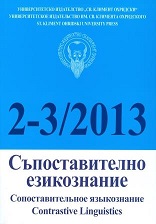Граматични средства за изразяване на несвидетелски съждения в съвременния испански език
Grammatical means for the expression of nonwitness information in presentday Spanish
Author(s): Maria Kitova-VasilevaSubject(s): Language and Literature Studies
Published by: Софийски университет »Св. Климент Охридски«
Summary/Abstract: The study aims at proving that some Indo-European languages that do not realize the category evidentialis / testimonialis are capable of developing morphological devices specialized at expressing problematic (probable or possible) judgments that can parallelly express ‘untestimony’ as well. These structures pertain to the verbal system of the Spanish language. They are presented: a) by several lines of paraphrases formed by modal verbs of obligation + simple or perfect infinitive and b) by the four future tenses of the indicative. The latter function as ‘biparticipants’: they fall in different paradigms and take different positions in the verb system. The structures realize themselves in the so called “relative reliability” – a modal logical-evaluation subcategory, different from mood – an intermediate zone set in the middle of the virtual modal axes, around whose two poles the forms of the two basic 239 Spanish moods are set: the mood of the objective reality (indicative) and the mood of the subjectively percepted reality or unreality (subjunctive). The probable and possible structures enter the frames of two functional semantic fields, where the forms of the two subjective epistemic statuses are placed, characterized by a complex double nucleus and gradual (overflowing) nature – a single subjective probable epistemic status as well as the double subjective possible epistemic status.
Journal: Съпоставително езикознание / Сопоставительное языкознание
- Issue Year: 2013
- Issue No: 2-3
- Page Range: 238-252
- Page Count: 15
- Language: Bulgarian
- Content File-PDF

